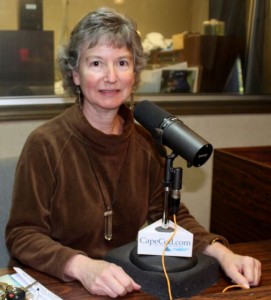 HYANNIS – For the first time ever, research using functional MRI scans has shown that mindfulness in the school classroom—the practice of focusing one’s awareness on the present moment—leads to better grades and mental health in students, less stress and anxiety, and fewer absences and suspensions. Two Massachusetts Institute of Technology (MIT) studies that led to the findings originated in the work being done by Cape Cod’s Calmer Choice.
HYANNIS – For the first time ever, research using functional MRI scans has shown that mindfulness in the school classroom—the practice of focusing one’s awareness on the present moment—leads to better grades and mental health in students, less stress and anxiety, and fewer absences and suspensions. Two Massachusetts Institute of Technology (MIT) studies that led to the findings originated in the work being done by Cape Cod’s Calmer Choice.
“Greater mindfulness correlated significantly with better academic achievement,” said the study’s lead researcher, John Gabrieli, and MIT neuroscientist and associate member of the McGovern Institute for Brain Research.
Since 2010, Calmer Choice has brought secular mindfulness-based education to 28 Cape Cod public schools and approximately 20 percent of the population of Cape Cod’s children. Calmer Choice drew the attention of MIT researchers because of its unique and carefully created curriculum and approach to teaching both students and teachers their program.
Calmer Choice’s innovative eight-week curriculum teaches skills to enhance key aspects of self-regulation known to be beneficial across multiple contexts to increase coping, buffer stress, regulate emotion, support better decision making and enhance interpersonal relationships. These strategies are nurtured by providing ongoing opportunities to practice and develop skills that are taught in the program.
Founder and executive director Fiona Jensen said she and her team were happy to take part in the MIT study.
“When MIT asks you to do a research study with them, you say ‘yes’ and then figure out how you are going to make it happen,” she said.
During each Calmer Choice session at the schools:
Students learn how to direct their attention to their experience through such things as focused breathing, listening, kindness, gratitude and happiness.
Students and teachers learn how these skills are like strength training for the brain and have been shown to rewire neurological pathways that make paying attention, sustaining concentration and regulating emotion easier.
Jensen credits Adria Kennedy, pediatric nurse practitioner, and Katie Medlar, program director at Calmer Choice, with developing the curriculum, which teaches optimism and understanding as well as ways to compassionately handle difficult emotions.
Research Curriculum
“In recent years, Cape Cod has been challenged by a sharp and dramatic increase of losing young people to suicides, opioid overdose and accidental deaths associated with high-risk behaviors,” said Jensen. “We created Calmer Choice in the hopes that it would be part of the response to these challenges, and I’m thrilled that research by MIT has shown that our curriculum is overwhelmingly successful. I’m so excited that more than 26,000 students, 1,000 teachers and other adults have had access to a curriculum that a pivotal research study has just validated.”
The MIT study involved 40 inner-city students who participated in Calmer Choice’s school-based program, administered in 2016 in Dorchester. Three instructors from Calmer Choice: Bob Jensen, Zoey Wolf and Medlar, went to Dorchester to teach in the classrooms that were part of the study. These students also participated in the first-ever brain imaging studies before and after the program. Both surveys of participants and results from the imaging study showed, for the first time, that mindfulness can alter brain activity in students.
Sixth-graders who took part in the Calmer Choice program not only reported feeling less stressed, but their brain scans revealed reduced activation of the amygdala, a brain region that processes fear and other emotions.
“Together, the findings suggest that offering mindfulness training in schools could benefit many students,” said Gabrieli. He added that the studies of Calmer Choice participants suggested that “mindfulness training could potentially help prevent or mitigate mood disorders linked with higher stress levels.”
Cape Cod Healthcare Therapist
Manny Marrero, a licensed occupational therapist with Cape Cod Healthcare and certified mindfulness instructor, will be teaching adult mindfulness classes for Calmer Choice to help support the growing demand. After two tours of duty in Iraq with the U.S. Military, Marrero credits mindfulness meditation with helping him deal with post traumatic stress disorder.
“I’m a walking testament to how wonderful meditation can be,” Marrero said. “Personally, it’s been very healing, and I enjoy teaching our patients, and soon, others on the Cape, how to practice mindfulness. The fact that we have a first-of-a-kind study from MIT that shows the amazing impact of Calmer Choice’s unique curriculum is so exciting.
“The study clearly shows that through mindfulness there was an increase in students’ grey matter in the areas of the brain responsible for attention. With increased attention and focus, there is an improvement across the board in academic performance. And now we have data to back that up. It’s just a wonderful thing.”
When students apply mindfulness, they live in the moment, are focused, calm and centered, Marrero said. They can relax more easily, breath more slowly, and therefore have better self-control and presence.
Calmer Choice’s founder aimed to impact the culture and outcomes of an entire school and community, working one person at time. Now, a group of revered scientists have shed a new light on Fiona Jensen’s mission to create a world where people lead lives of kindness and compassion toward themselves and others.























